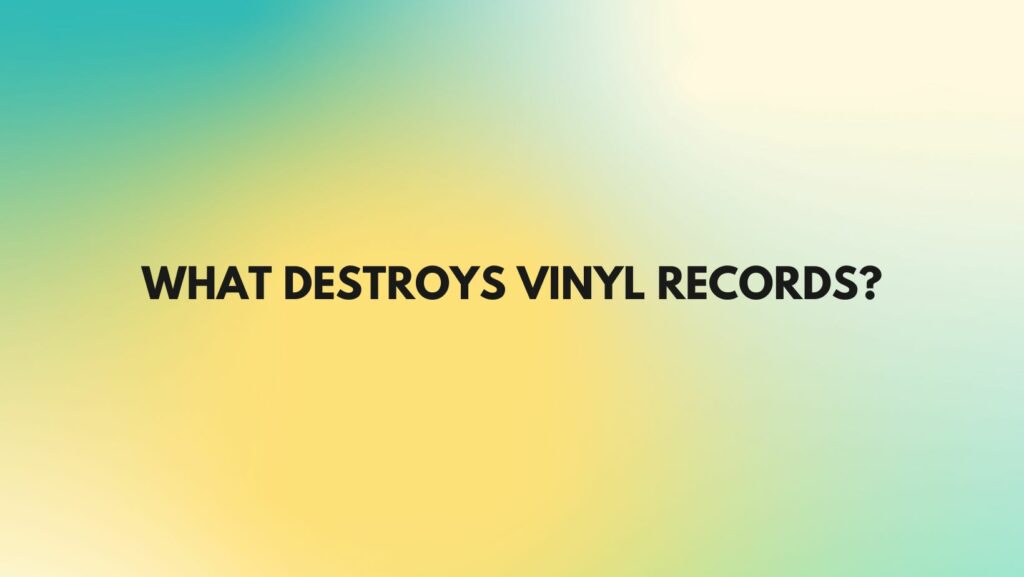Vinyl records, cherished for their unique sound and nostalgic charm, demand meticulous care to preserve their integrity. However, certain factors can pose threats to these sonic treasures, potentially leading to irreparable damage. In this guide, we’ll delve into the various elements and practices that can destroy vinyl records, equipping enthusiasts with the knowledge to safeguard their beloved collections.
- Improper Handling and Storage:
Vinyl records are delicate, and mishandling can lead to scratches, scuffs, and warping. Handling records by the edges, using a proper grip, and storing them vertically in a cool, dry place helps prevent physical damage.
- Exposure to Extreme Temperatures:
Vinyl records are sensitive to temperature fluctuations. Exposure to extreme heat or cold can cause warping, affecting the flatness of the record and compromising its ability to play smoothly.
- Direct Sunlight and UV Exposure:
Prolonged exposure to direct sunlight or ultraviolet (UV) light can damage vinyl records. UV rays can cause fading of album covers, while the heat generated can contribute to warping and distortion of the vinyl itself.
- Dust and Debris Accumulation:
Dust and debris settling into the grooves of vinyl records can be detrimental to playback. These particles can cause surface noise, pops, and clicks, diminishing the overall listening experience.
- Inadequate Cleaning Practices:
Cleaning vinyl records is essential, but improper methods can cause more harm than good. Abrasive brushes, harsh cleaning solutions, and excessive pressure during cleaning can scratch the record surface and compromise sound quality.
- Storage in Paper Sleeves:
While paper sleeves may seem like a classic choice, they can lead to scratches and static buildup. Switching to anti-static inner sleeves or polyethylene sleeves can help mitigate these issues.
- Non-Compliant Turntable Setups:
Using a turntable with an incorrectly set tracking force, improper cartridge alignment, or a worn-out stylus can lead to excessive wear on vinyl records. Regularly calibrating and maintaining your turntable ensures optimal performance and longevity.
- Poor-Quality Needles and Cartridges:
Investing in high-quality needles and cartridges is crucial for the longevity of vinyl records. A worn-out or misaligned stylus can dig into grooves, causing permanent damage to the record.
- Excessive Playing without Cleaning:
Repeatedly playing records without proper cleaning can embed dirt and debris into the grooves. Over time, this buildup can lead to increased surface noise and affect the clarity of the audio.
- Spills and Fluid Exposure:
Accidental spills or exposure to liquids can wreak havoc on vinyl records. Liquids can seep into the grooves, causing warping, mold growth, and irreversible damage.
- Unstable Turntable Surfaces:
Placing a turntable on an unstable or vibrating surface can lead to skipping and distortion. Sturdy, vibration-resistant surfaces help maintain a stable playing environment.
- Chemical Exposure:
Exposure to harsh chemicals, such as household cleaners or solvents, can damage vinyl records. Using purpose-built record cleaning solutions and avoiding DIY mixtures with unknown ingredients is advisable.
Conclusion:
Preserving the longevity and sonic quality of vinyl records requires a combination of thoughtful handling, proper storage, and adherence to best practices in turntable setup and maintenance. By steering clear of destructive elements like extreme temperatures, improper cleaning practices, and exposure to harmful substances, vinyl enthusiasts can ensure that their collections endure, offering an authentic and enjoyable listening experience for years to come. Remember, a cautious and informed approach is key to protecting these sonic treasures from the threats that may lurk in the corners of our record-playing endeavors.


